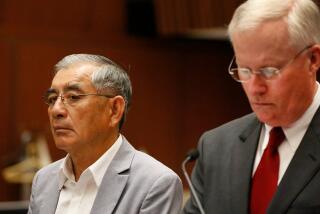Ex-Planning Commissioner Accused of Interest Conflict
- Share via
SACRAMENTO — A former Rancho Palos Verdes planning commissioner was accused Tuesday of conflict of interest by the California Fair Political Practices Commission.
Dr. Harvey Brown, an ophthalmologist at Kaiser Permanente Medical Center in Harbor City, was charged by the commission with arranging to receive a loan of $135,000 from Burrell Ltd. in August, 1983, a few weeks before he voted to approve a coastal permit for an apartment building proposed by Burrell.
Brown, who received the loan after he had voted on the permit, was removed from the Planning Commission by the Rancho Palos Verdes City Council last April because he failed to report his ties to the developer. However, Brown denied through an attorney that he has violated any laws.
James Gross, a Sacramento attorney hired by Brown, said the commission staff is incorrectly contending that Burrell Ltd. had promised to loan Brown $135,000 to build a new home. Instead, Gross said Tuesday, Brown had run into difficulty securing the remainder of the construction financing from a bank, and, as a result, the loan from Burrell was up in the air at the time of his vote.
“The commission’s staff is saying, ‘We know they were talking. We know a deal was in the works, and it’s not right that it wasn’t reported,’ ” Gross said. “But they are stepping well beyond the law in doing that. No money changed hands. No promises had been made. You can’t fine somebody for discussing business.”
However, Susan Harrigan, a spokeswoman for the commission, said the doctor had reason to believe that Burrell Ltd. would become a source of income and should have abstained from voting on issues related to the company.
“It’s called foreseeability,” Harrigan said. “If you may foreseeably have a contract, you must report it.”
She said that although it is not illegal for officeholders to negotiate with individuals who may later come before the officeholder for votes, “at some point in the negotiating it becomes clear that it’s no longer talk, and it’s going to be a reality. That’s when they have to disclose it.”
Last April, the City Council voted unanimously to remove Brown from the Planning Commission--a post he had held for six years--for failing to disclose the loan. At that time, city officials said they did not believe Brown had abused his position as a planning commissioner but were removing him because the appearance of a conflict might hurt the city’s reputation.
Informed City Attorney
In late 1984, Brown informed the city attorney that he had received the loan, but he never reported it on his financial disclosure statement, the commission said.
Gross said Brown asked the city attorney, Steve Dorsey, whether he needed to disclose the loan, and based upon a written response from Dorsey, “he was under the impression the loan did not have to be reported.”
Dorsey, who works for the city on a contract basis, could not be reached for comment at his offices in Los Angeles.
The case will next be heard by an adminstrative law judge or by the commission. If found guilty, Brown faces up to $4,000 in fines.
More to Read
Sign up for Essential California
The most important California stories and recommendations in your inbox every morning.
You may occasionally receive promotional content from the Los Angeles Times.










